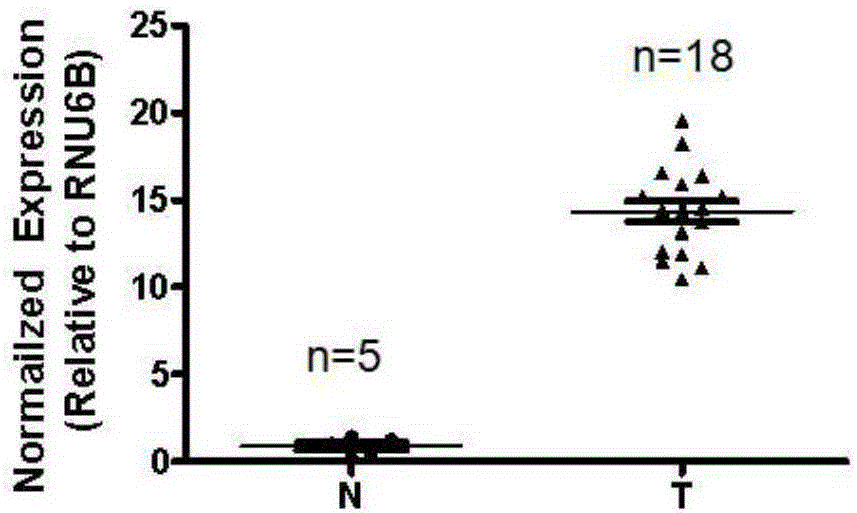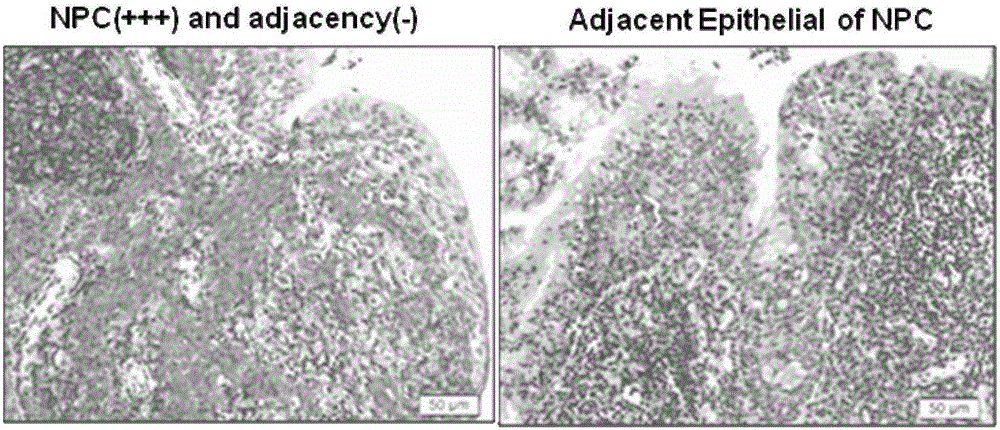Application of long-chain non-coding RNA (ribonucleic acid) gene LOC553103 in preparation of nasopharynx cancer prognosis preparation
A long-chain non-coding, nasopharyngeal cancer technology, used in DNA/RNA fragments, recombinant DNA technology, determination/inspection of microorganisms, etc.
- Summary
- Abstract
- Description
- Claims
- Application Information
AI Technical Summary
Problems solved by technology
Method used
Image
Examples
Embodiment 1
[0088] Example 1, real-time fluorescent quantitative PCR method detection confirmed that BART6-3p was up-regulated in nasopharyngeal carcinoma
[0089] 1. Materials and methods:
[0090] Collect 5 cases of normal nasopharyngeal epithelial tissues and 18 cases of nasopharyngeal carcinoma tissues, extract total RNA with Trizol (product of Invitrogen Company), reverse transcribe 2 μg RNA into cDNA with miScript reverse transcription kit (product of Qiagen Company), and use QuantiTectSYBRGreenPCR kit (Qiagen company product) Real-time fluorescent quantitative PCR was used to detect the expression of BART6-3p and internal reference gene RNU6B. The public primers (UniversalPrimer) of microRNA and the specific primers of BART6-3p and RNU6B were all designed and synthesized by Qiagen.
[0091] Real-time fluorescence quantitative PCR reaction system
[0092]
[0093] Real-time fluorescent quantitative PCR reaction steps
[0094] 194℃5min
[0095] 295℃10sec
[0096] 358℃30sec
...
Embodiment 2
[0106] Example 2, in situ hybridization detection found that the expression of BART6-3p in nasopharyngeal carcinoma and gastric carcinoma is related to the prognosis of patients
[0107] 1. Material method
[0108] 1.1 Design and synthesis of hybridization probes
[0109] In order to detect the expression of BART6-3p by in situ hybridization, we designed an oligonucleotide probe for detecting the expression of BART6-3p by in situ hybridization and a positive control in situ hybridization oligonucleotide probe.
[0110] BART6-3p probe: UCUAAGGCUAGUCCGAUCCCCG
[0111] Positive control probe (to detect the housekeeping gene GAPDH):
[0112] GAPDH probe: CAGUAGAGGCAGGGAUGAUGUUCU
[0113] The gene-specific oligonucleotide probe sequences designed above were synthesized by chemical synthesis method, and uracil in the probe sequences was labeled with biotin (bio-U) during the synthesis process.
[0114] 1.2 Oligonucleotide probe labeling kit and in situ hybridization detection re...
Embodiment 3
[0180] Example 3, Overexpression of BART6-3p inhibits growth, proliferation, invasion and metastasis of tumor cells
[0181] 1. Material method
[0182] 1.1 Cell culture and transfection
[0183] EBV-negative nasopharyngeal carcinoma cell lines 5-8F, HNE2, and gastric cancer cell AGS were purchased from the Cell Center of Central South University. The RPMI1640 medium and fetal bovine serum used for cell culture, and the trypsin used for digesting cells were all products of Gibco, USA.
[0184] BART6-3p is synthesized by Invitrogen Company through chemical synthesis, and the sequence is:
[0185] CGGGGAUCGGACUAGCCUUAGA
[0186] Tumor cell lines with good growth status were divided into 2×10 5 Cells / well were seeded in a 6-well plate, and the 6-well plate was placed at 37°C, 5% CO 2 In the incubator, the transfection of BART6-3p can be started when the cells to be cultured grow to a density of 50-70%; the transfection process is as follows:
[0187] Add 8 μl of Hiperfect tr...
PUM
 Login to View More
Login to View More Abstract
Description
Claims
Application Information
 Login to View More
Login to View More - R&D
- Intellectual Property
- Life Sciences
- Materials
- Tech Scout
- Unparalleled Data Quality
- Higher Quality Content
- 60% Fewer Hallucinations
Browse by: Latest US Patents, China's latest patents, Technical Efficacy Thesaurus, Application Domain, Technology Topic, Popular Technical Reports.
© 2025 PatSnap. All rights reserved.Legal|Privacy policy|Modern Slavery Act Transparency Statement|Sitemap|About US| Contact US: help@patsnap.com



